Technical Training

Empower School of Health’s technical training programmes equip professionals with the practical skills and knowledge needed to excel in today’s technology-driven environment. Focusing on hands-on learning, these programmes cover a broad range of disciplines, including healthcare, education, pharmaceuticals management, digital health, data management, tuberculosis, and supply chain management. By incorporating industry best practices and the latest technologies, ESH enhances both individual capabilities and overall organisational capacity.
Through our targeted training approach, we help:
- Enhance Technical Proficiency: Equipping individuals with up-to-date technical skills tailored to their specific job roles.
- Promote Continuous Learning: Developing programs that foster a culture of continuous skill development and innovation.
- Improve Operational Efficiency: Ensuring that teams are fully capable of leveraging advanced tools and technologies to improve productivity and streamline processes.
- Support Career Advancement: Preparing professionals for advanced roles and certifications to meet their career goals.
Executive Leadership Programme
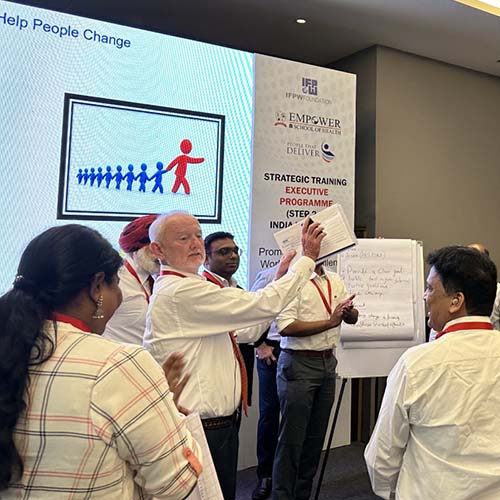
The STEP 2.0 program is specifically tailored to the needs of health supply chain leaders and managers, blending elements of self-paced learning, facilitator-led training, on-the-job application of leadership skills and coaching support, over a period of four to six months. The key objectives of the program are to familiarise the participants with principles of leadership styles and strategies of change management, enable them to apply these principles and strategies to address supply chain challenges in their context and become a part of a network of programme and country supply chain practitioners and public health leaders – their peers.
The programme begins with an 8-week virtual interaction phase focused on management and soft skills training, including leadership assessments and transformational challenge. This is followed by a 5-day face-to-face workshop, where participants, with the guidance of private sector coaches and facilitators, develop a project to improve a specific aspect of PSCM in their organisation. Finally, over 12 weeks, participants return to their workplace to implement their project with ongoing remote support from coaches and facilitators.
Content Design & Development
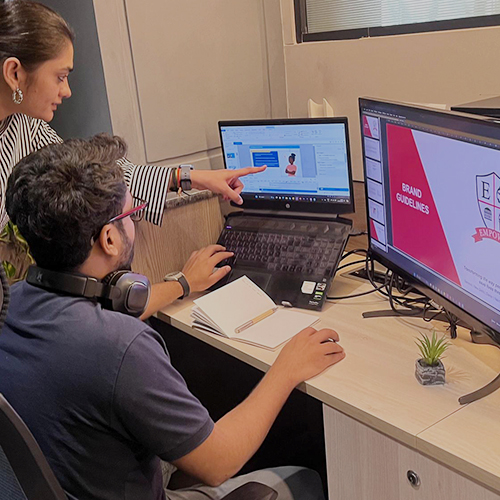
Empower School of Health offers tailored digital content designed to meet the specific needs of learners, available in English as well as multiple regional and international languages. Our content development process follows a structured learning approach that includes clear learning objectives, guided instruction, narration with subtitles, and assessments at the end of each lesson.
With a team of experts across learning design, instructional design, graphic design, linguistics, and quality analysis, ESH delivers content ranging from simple to advanced complexity. Our modules vary in interactivity, from Level 1 to 3+, incorporating elements like game-based learning, augmented reality, and avatars to enhance engagement and innovation.
e-Learning

At Empower School of Health, our e-Learning platform provides flexible, high-quality education designed to meet the evolving needs of healthcare professionals globally. With interactive, multimedia-rich courses, we ensure that learners can access up-to-date content anytime, anywhere. Our programs are tailored to bridge the gap between theory and practice, offering real-world applications and certifications that enhance career growth. Whether online or through blended learning, our e-Learning solutions make professional development in health and supply chain management Training accessible and engaging, especially for individuals in remote or resource-limited settings.
Games, Augmented Reality, Virtual Reality

Our innovative approach to learning combine gamification and , augmented and virtual reality to create immersive training experiences that engage and inspire participants. By transforming traditional content into interactive simulations, we enhance knowledge retention and real-world application.
Instructor-Led Training (ILT) and virtual Instructor-Led Training (vILT)

At Empower School of Health, we offer both Instructor-Led Training (ILT) and Virtual Instructor-Led Training (vILT) to cater to diverse learning needs. Our ILT sessions provide face-to-face, hands-on training with expert instructors, fostering real-time interaction, group activities, and personalised feedback. For those seeking flexibility, our vILT programs deliver the same high-quality instruction in a virtual format, allowing participants to engage from any location while benefiting from live discussions, breakout sessions, and interactive tools. Both formats are designed to enhance learning outcomes through active engagement and practical application in the health and supply chain sectors.
Video Production

At Empower School of Health, our video production services transform complex health and supply chain concepts into engaging, visually compelling content. We specialise in creating high-quality educational videos that simplify learning, enhance engagement, and improve retention. From instructional tutorials to interactive case studies, our professional videos bring subjects to life, making training more accessible and impactful for diverse audiences. Whether for e-Learning, blended learning, or promotional purposes, our video content is designed to resonate with learners and inspire real-world application.
Turnkey Solutions
A turnkey solution is a fully complete and ready-to-use system or service provided by a company, requiring minimal effort from the client. It covers everything from design to implementation, allowing the client to simply “turn the key” and begin using it immediately.
Digital Capacity Building Unit (DCBU)

The Digital Capacity Building Unit (DCBU) brings a transformative approach to the digital learning ecosystem by enhancing access, ensuring quality, building competency, integration and driving urgency in health workforce development. DCBU offers physical, digital, and hybrid training accessible to anyone, anywhere, at any time, with standardised, competency-based learning tools tailored in consultation with government and industry experts.
Core Functions of DCBU:
- Testing innovative digital training tools developed by partner agencies.
- Training through the design, development, delivery, and documentation of high-quality materials.
- Talk (Advocacy) Champion digital learning by being a strong advocate of high quality, equitable and secure training through digital platforms.
DCBU Structure:
The establishment of DCBUs to strengthen sustainable institutional capacity includes:
- Software: Knowledge Management Systems (KMS), Learning Management Systems (LMS), and Training Management Information Systems (TMIS).
- Hardware/Infrastructure: Smart classrooms and modernised training units.
- Content: Self-paced e-Learning, game-based learning, 2D/3D animations, AR, and video production.
- Human Resources: Subject matter experts, content creators, instructional designers, and quality experts.
DCBU Implementation:
- Diagnose: Assess learners’ needs and organisational goals.
- Design: Create tailored learning frameworks and digital platforms.
- Deliver: Pilot, gather feedback, and implement at scale.
- Document: Track challenges, outcomes, and learnings.
- Disseminate: Share knowledge with stakeholders to enhance future training efforts.
Open Mobile Classroom (OMC)
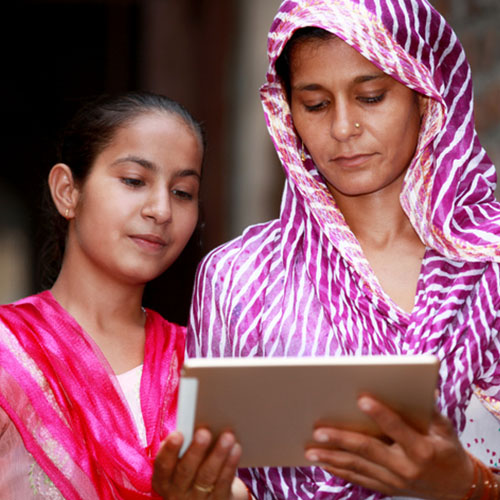
Empower School of Health’s Open Mobile Classroom is an innovative, mobile digital solution designed to deliver blended learning to remote areas, fostering learning and behaviour change. It offers over 1,000 hours of real-time, continuously updated content, accessible both online and offline without relying on Wi-Fi or electricity. Equipped with tablets, USB charging hubs, and other digital tools, it enables interactive, multilingual education on various topics. This scalable and equitable classroom is particularly impactful for health training and behaviour change communication in diverse environments.
Key Features:
- Accessible online and offline, ensuring continuous learning in low-bandwidth areas.
- Can inform, educate, and train health workers, communities, and beneficiaries in any language and on any topic.
- Real-time data tracking and interactive assessments to measure learning outcomes.
ESH’s Digital Learning Innovation Lab has developed this mobile classroom to be a game-changer for remote learning, strengthening workforce capacities and fostering community engagement at scale.
Modernised Training Unit
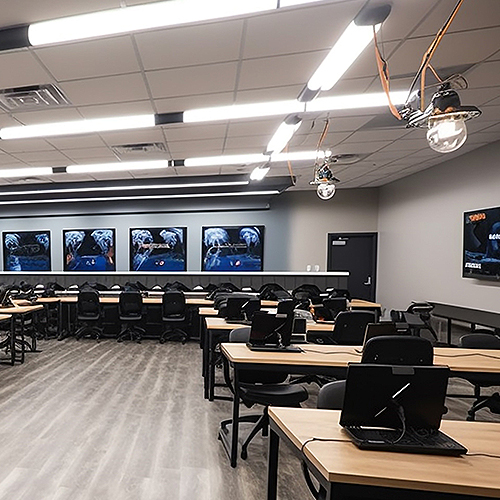
A Modernised Training Unit (MTU) utilises a modular structure that supports online and blended learning. By incorporating diverse content formats and real-world scenarios, it caters to various learning styles while ensuring accessibility. Technology plays a key role, with tools to create learning content, conduct conferences, host online and offline training, conduct interactive and immersive learning sessions, and provide personalised learning experiences.
Community of Practice

One of our most valuable digital solutions is the CoP that brings and keeps the people (learners, coaches, partners) and the content (courses and resources) together, thereby enabling dialogue between the participants. This platform requires one or more people to moderate the discussions, engage in advocacy, and continuously update community-sourced content.
Key features of the CoP platform:

Digital Solutions
A digital solution refers to the use of technology to solve problems, improve processes, or create efficiencies. These solutions involve software, platforms, or tools like apps, cloud services, and data analytics to address business or consumer needs. Digital solutions help organizations adapt to the evolving digital landscape, offering innovative ways to connect, collaborate, and achieve goals faster and more effectively.
Learning Management System (LMS)

Empower School of Health offers the development of a bilingual, customised learning platform built on Moodle, an open-source framework. Tailored to meet the needs of diverse organisations, this platform provides seamless access to adult-based learning, both online and via mobile devices (iOS and Android). Designed for interoperability, it allows for the integration of third-party plugins, content uploads, and external applications, enabling effective training for both internal and external audiences while supporting specific functional requirements.

Training Management Information System (TMIS)

Empower School of Health specialises in developing customised Training Management Information Systems (TMIS) that offer advanced data analytics, dynamic training dashboards, and tools for planning and tracking user learning journeys. Our TMIS solutions assist decision-makers and stakeholders to easily analyse and monitor the progress of trained and untrained human resources within the public health sector, driving informed decisions and strengthening workforce capacity.
Knowledge Management System (KMS)

At Empower School of Health, we understand that in today’s rapidly evolving world, resilience and preparedness are essential. Our Knowledge Management System (KMS) is designed to foster innovation, facilitate knowledge transfer, and enable informed decision-making, ensuring our teams can respond swiftly to emergencies and challenges. By incorporating global best practices, our KMS enhances the effectiveness of interventions and drives better outcomes. To further support the dynamic needs of our projects, we have integrated a specialised “Surge Support” feature, offering on-demand creation of high-quality, project-specific materials. This service leverages the expertise of our Subject Matter Experts (SMEs) to quickly transform complex data into clear, actionable resources, ensuring that our KMS remains adaptable and responsive to the changing operational demands faced by our partners and teams.
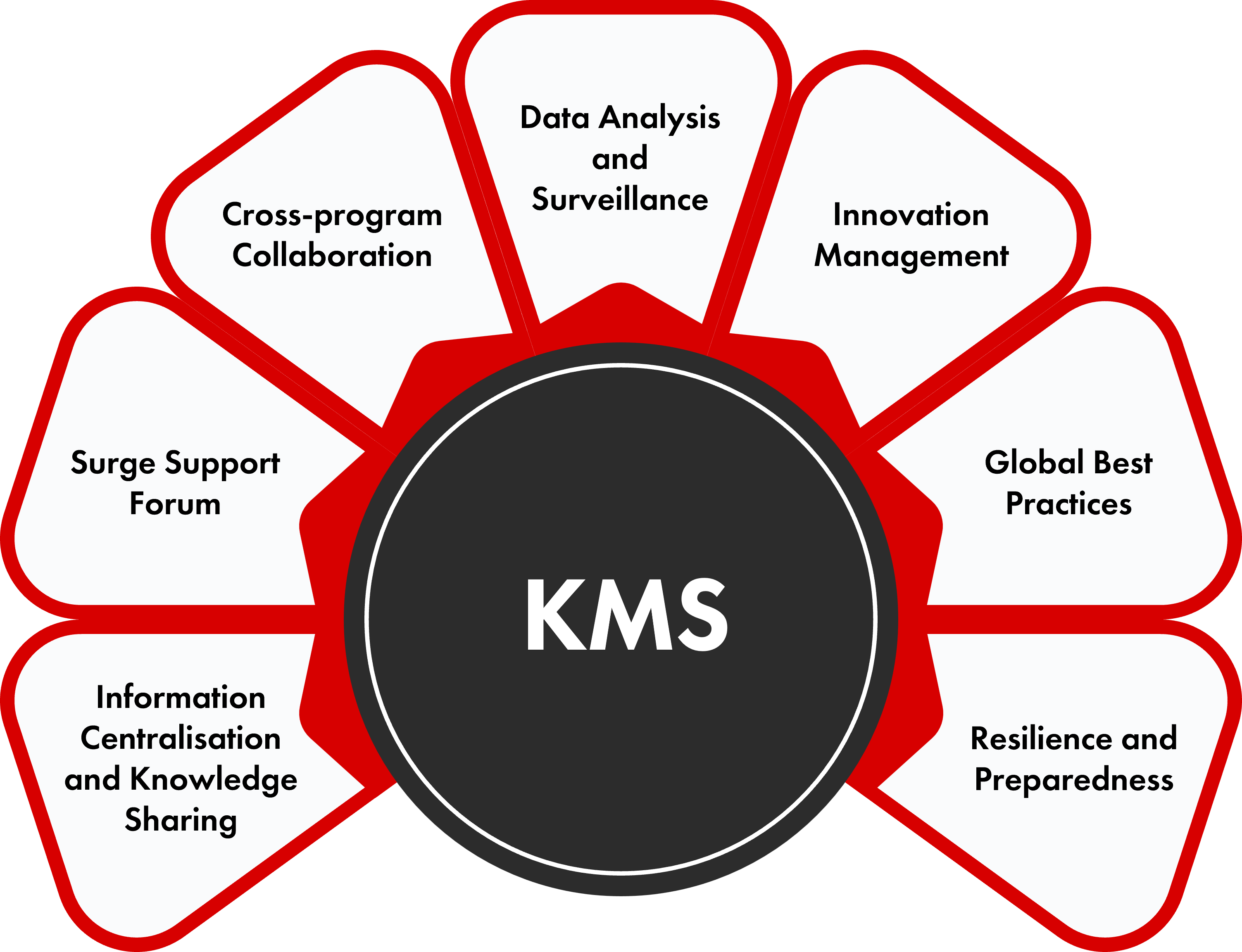
Competency Assessment Tools (CAT)

Empower’s Competency Assessment Tool (CAT) is a digital and scalable solution designed to evaluate the capacity development needs of Procurement and Supply Management (PSM) professionals. Tested and deployed across Asia and Africa, the CAT helps determine individual PSM competency profiles by assessing educational qualifications, work experience, and domain-specific expertise.
The tool provides a comprehensive analysis in key areas such as product selection, procurement, supply chain management, and rational use of medicine. By mapping these competencies, CAT enables stakeholders to identify training gaps, guide workforce development, and enhance overall efficiency in supply chain management.
CAT also captures critical metrics, including completion rates, competency
levels, dropout rates, and learning outcomes.
The assessment generates
two types of reports:
- Individual reports showcasing scores for each competency.
- Comprehensive reports with a detailed analysis of demographics, education, work experience, and technical skills.
Empower’s CAT is an essential tool for organisations aiming to build and strengthen the competency of their supply chain workforce, ensuring effective procurement and supply management practices.


